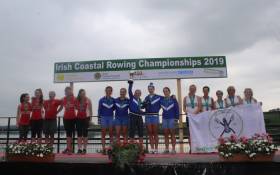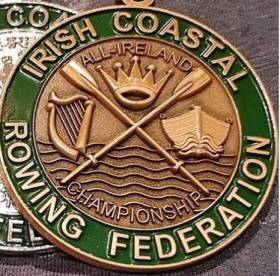Displaying items by tag: Galley Flash
#Coastal Rowing: Myross won the senior men’s title for the second weekend in-a-row at the Irish Coastal Rowing Championships at the National Rowing Centre. The had also won at the ICRF All-Ireland. Killorglin won the senior women’s crown.
In excellent conditions, the contest for the Club of the Championships was close. The prize goes to the club with the most wins. Holders Kilmacsimon could have taken it with wins in the final two races but were denied and Whitegate, the hosts, were crowned champions.
Galley Flash Win All Ireland Coastal Title
#CoastalRowing: Galley Flash won the senior men’s title at the All Ireland Coastal Rowing Championships in Ballyshannon, Donegal. The West Cork crew led for virtually all the race from local rivals Kilmacsimon, with Courtmacsherry always in third.
Vartry won the intermediate title by two lengths.
Workmen’s from Kerry won a good final of the Senior Ladies competition. Galley Flash led early on, but Workmen’s had taken the lead by the turn and went on to forge a clearwater advantage, though Galley Flash finished well.
All Ireland Coastal Rowing Championships, Ballyshannon, Donegal (Selected Results)
Men
Senior: 1 Galley Flash 11 min 16 sec, 2 Kilmacsimon 11:21, 3 Courtmacsherry 11:26. Intermediate: Vartry. Junior: Ring.
Women
Senior: 1 Workmen’s 7:34, 2 Galley Flash 7:38, 3 Kilmacabea 7:49. Inter: Worken’s A 7:42. Jun: Kilmacsimon.

























































